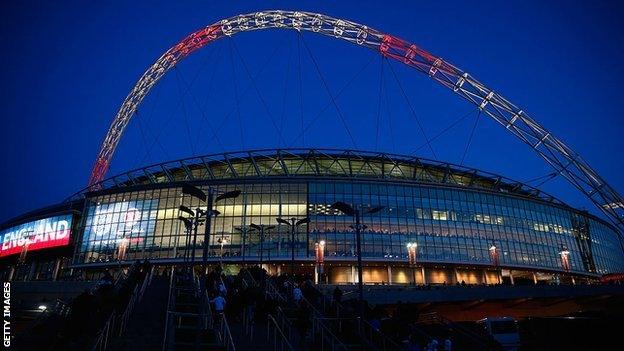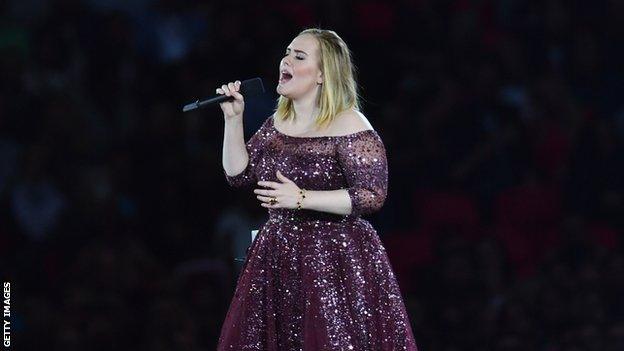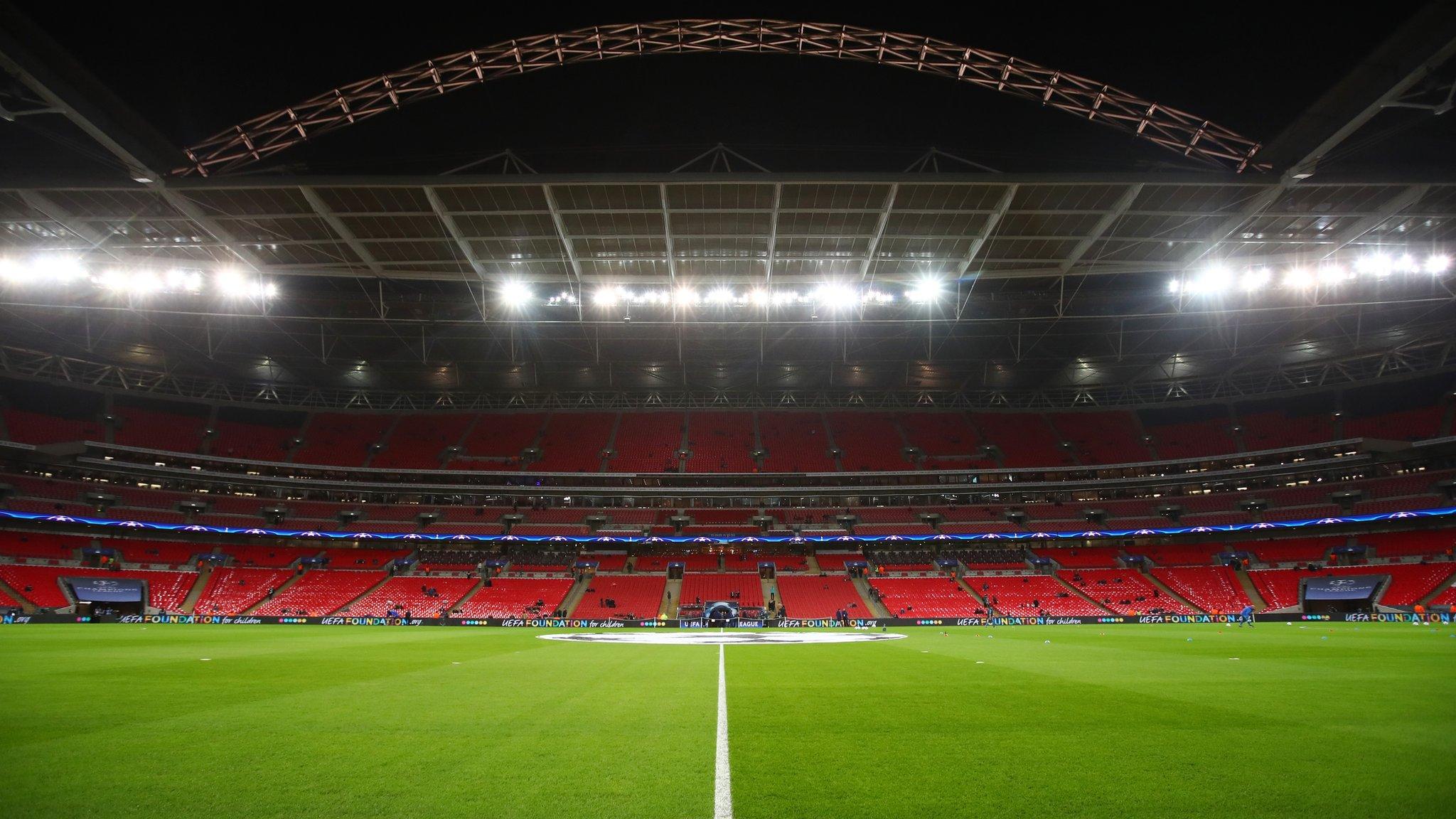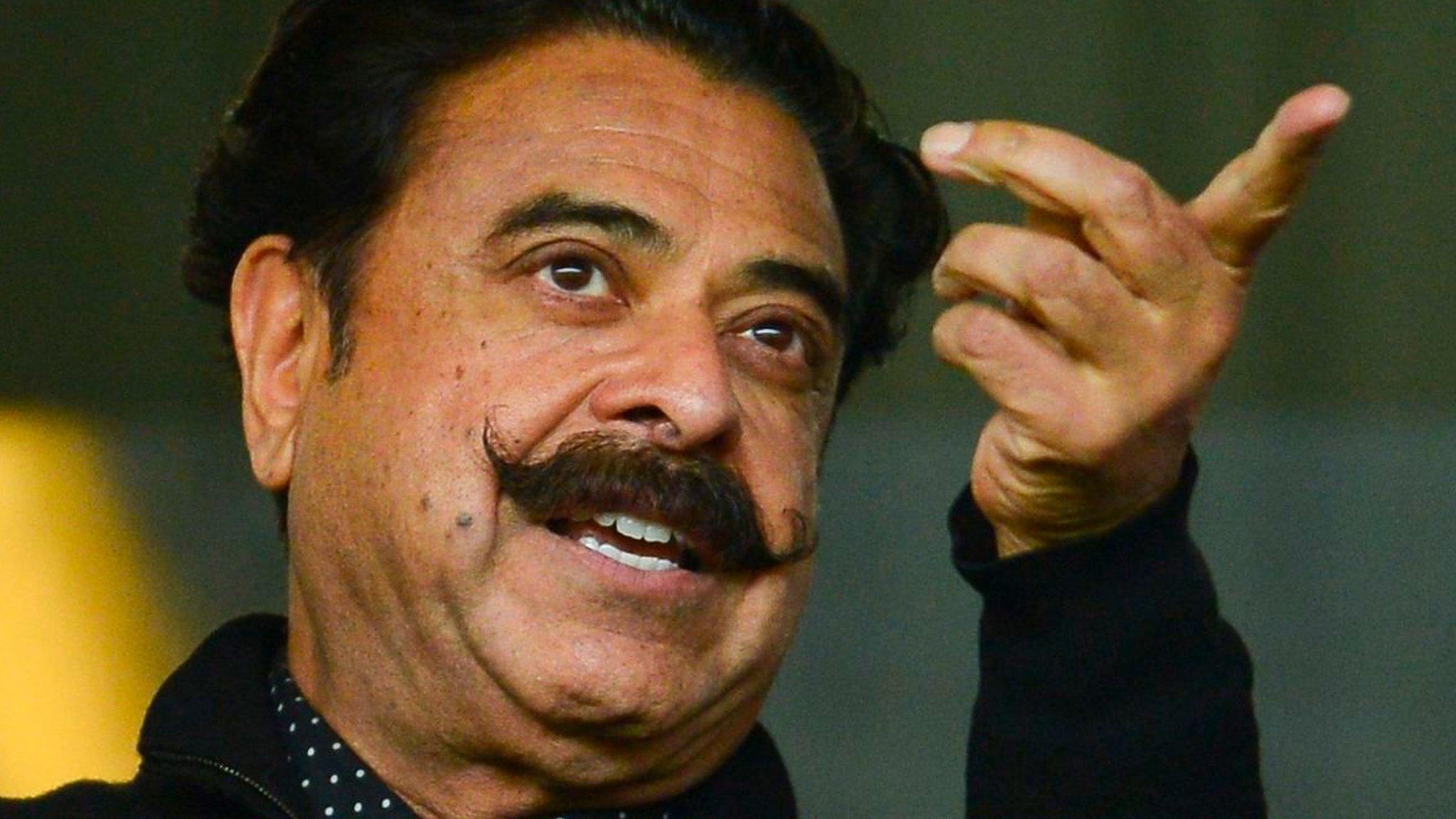Wembley: People need to 'get past the emotion' over sale says Shahid Khan
- Published

Wembley would still have the option to host England games after any deal is done
Billionaire Shahid Khan says people need to "get past the emotion" to see his proposed purchase of Wembley Stadium is a good deal for fans.
He also confirmed the deal to buy it from the Football Association, revealed last week, would be worth around £1bn.
Many fans have said they are against the sale of the national stadium.
Meanwhile, former FA chairman Lord Triesman says he fears people at the organisation "who know very little about it taking the final decision".
American Khan, the owner of Championship side Fulham and NFL franchise Jacksonville Jaguars, has been in discussions with FA chief executive Martin Glenn and chairman Greg Clarke, who he says are "happy with the offer - or we wouldn't be discussing it at this stage".
It is understood the proceeds from the sale of the 90,000-capacity stadium, originally opened in 1923 but redeveloped since, would allow the FA to make a major investment into football at grassroots level.
"I think once people get past the initial emotion, look at it with the logic, the reason why it's good for English football, why it's good for the FA, why it's good for the consumer," Khan told BBC Radio 5 live's Sportweek.
"Once you look at all of that, I think this is a very good deal for all parties involved."
Shahid Khan - If you love English football, Wembley deal must go ahead
Khan hopes England will play at Wembley
The Pakistan-born businessman, who has a net worth of $7.2bn (£5.2bn), is the 217th richest person in the world, according to the 2018 Forbes rich list.
He said the offer for the stadium is £600m but the FA would retain all the national games and cup games, which generate revenue for the association, and have a value of about £400m.
However, he could not rule out the possibility of the association opting to move games in the future.
"I would hope they choose Wembley in the future for as many of those," he said. "But they might decide they want some of these events distributed throughout England. We want them all to be at Wembley."
The FA did not own the old Wembley until 1999 and England are also the only team among the home nations whose FA owns the national stadium.
Their latest financial results show they still owe £113m to public bodies such as Sport England, the Department of Culture, Media and Sport and the London Development Agency and it said in January it would finish paying for the ground by the end of 2024.
'Wembley is a piece of real estate'
Triesman, who became the FA's first independent chairman in January 2008 but resigned in 2010, said he had "real misgivings" about the sale of the stadium, but was more concerned about the influence the FA council will have on the decision-making process.
"One thing I know from the FA is that the internal structures, the people on the board and on the council, in the final analysis they have the final say," he explained.
"I think however skilled the FA's specialist advisors may be, unless you have got absolutely the right team we will find that a number of people who know very little about it are taking the final decisions.
"The top executive team is very good - beyond that there isn't much skill.
"When the first arrangements were made for the re-building of Wembley it was true that people with knowledge of the football business were involved but I wouldn't say there were people who were real experts on real estate.
"Wembley is a piece of real estate, like it or not, and I don't know whether that knowledge is there now."
The Labour peer added that although he thought it was in the power of the council to veto any vote, he hoped that it would back Khan's bid, which could see his NFL side take up permanent residency at Wembley.
"I hope they would say we may know a lot about grassroots football around the country, but we know nothing about the finances and the economics of a huge stadium which is a piece of the national legacy," he said.
"I want to know exactly how the stadium will be used once it is in private hands because there was a great deal of public money and public interest in the re-creation of a national stadium and I'd want to know it will still be going to meet some of those objectives that people had at the time.
"Given it was public money, I can't see why there should be no full disclosure of the negotiations which are going on."
'Enhancing the experience'

Adele is one of the many music stars who have performed in concert at Wembley Stadium
As well as football, Wembley hosts rugby league's Challenge Cup final, plus music events over the summer months and while an NFL franchise at the venue would add extra revenue, Khan knows the venue has huge future potential.
"We would be trying to run a stadium, improve the game-day experience and adding more events to make it a venue that adds value, adds revenue and improves the experience and quality of life for all the people around it," he said.
"It's much more than money, it's being a steward of a civic asset - it's about really enhancing the experience, you have to invest more in Wembley, which it's ready for at this point.
"It's 12 years old, it needs investment. It needs to have other events to create more revenue. NFL games, about 70% of the attendees are not from Greater London so that ties in with the mission of tourism and creating economic growth."
Meanwhile, former England manager Kevin Keegan, who resigned after the team's last match at the venue in 2000 before it was redeveloped and opened again in 2007, said he supported Khan's bid to buy the venue.
"As long as England can play there, why not?" he said. "It's been used for years and years and years for other things. It's much more than a football stadium. It's a boxing ring, it's a concert hall.
"I'm old enough to remember when it had greyhound racing."
- Published27 April 2018

- Published26 April 2018
